- Home
- Stephen R. Donaldson
The Gap Into Vision: Forbidden Knowledge Page 3
The Gap Into Vision: Forbidden Knowledge Read online
Page 3
She would be guessing every step of the way. And every guess was dangerous. Any mistake, any miscalculation, any accident might betray her to Nick.
But the problem went deeper. Angus’ use of her had left her half insane and profoundly weary, even though he’d frequently imposed rest on her. How could she know that madness and exhaustion weren’t endemic to the use of a zone implant? How could she know that her efforts to save herself weren’t about to damn her?
She couldn’t know. She wasn’t wise enough to tamper with herself this way.
On the other hand, she was here because Angus had driven her half insane. There was no escape that didn’t also involve insanity.
A small thunk carried through the ship’s hull—the characteristic jolt of undocking. When the grapples and cables snapped clear, everyone aboard always knew it.
Morn was running out of time.
As Captain’s Fancy floated free, g disappeared. The involuntary contraction of her muscles, bracing herself against undock, sent her adrift in the cabin.
In moments, however, the intercom piped a warning, and the bridge crew engaged the spin that produced internal g. The berth reoriented itself; Morn settled to the new floor.
Such maneuvers were familiar to her. Instead of distress, she felt simple gratitude that Nick engaged g so soon. Most captains liked to run a considerable distance out from dock—to be sure they were clear, and to refresh their recollection of zero g—before they took on the inertial inflexibility of spin.
Grimly she pushed another button.
Wrong one, wrong one, this button brought pain, the entire surface of her skin seemed to catch flame. Angus had told her that her father was flash-blinded when she blew up Starmaster’s thrust drive. His face must have felt like this, all fire and agony, every nerve excoriated beyond bearing.
Her muscles convulsed in a spasm of fire and remembrance. She stabbed wildly at the control, trying to hit CANCEL.
She missed. Instead she got the button she’d already tried, the one that made her rest.
The effect astonished her. In an instant she was transformed.
It was magic, a kind of neural alchemy. Out of absolute pain, it created something she needed more than energy, something which would enable her to deal with Nick—something which Angus had never tried on her, either because he didn’t know what it would do or because he didn’t want it.
In a sense, the combination she’d keyed didn’t ease the pain, not entirely. Instead the hurt was translated almost miraculously into something quite different—a sensual ache which focused itself in the most sensitive parts of her body, so that the tips of her breasts burned as if they could be quenched by kisses, and her mouth and loins became hot and damp, hungry for penetration.
For several moments she was so overwhelmed by the sensations of desire that she couldn’t stop them. She didn’t realize she was writhing hungrily on the berth until thrust ran through Captain’s Fancy and caught her off balance, toppled her to the floor.
Not much thrust: just enough to get the ship under way. Nevertheless the fall restored Morn’s self-awareness; she grabbed the control and canceled it.
Then she clung to the berth and breathed hard, trying to absorb the shock of sensation and discovery.
She’d found it, the answer to her immediate problem: a way of responding to Nick that wasn’t predicated on revulsion. For the time being, she now had the means to endure his touch.
And if, like Angus’, Nick’s lust included the desire to inflict pain, she would be able to experience it as pleasure. She would be protected—
No wonder Angus had never used this particular function. It would have made her paradoxically invulnerable: accessible to everything his hate required; inaccessible to terror.
Now she could rest. At the moment, the only guess she had to make was, when would Nick come? How much time did she have? Thrust complicated the direction of Captain’s Fancy’s g; it made movement around the cabin awkward. All the more reason to roll into the berth, velcro herself secure, and let her exhaustion take her away. When he arrived, she would have to face his suspicions. Whatever they were. Until then—
She didn’t do it. Angus Thermopyle had taught her more things than either of them had realized. There were still precautions she could take, ways to camouflage the truth.
She went back to work on her door lock.
This time she keyed the door to open on request—after a five-second delay, and a chime to warn her that someone wanted in.
Then, bracing herself against the tug of complex g, she moved into the san, peeled off the ill-fitting shipsuit Angus had given her, consigned it to the disposal chute, and took a long shower. She didn’t emerge until her arms felt leaden from scrubbing herself, and the san’s suction had dried her pristine. She couldn’t wash away her crime, but the shower made her skin more comfortable.
After that, she stretched out naked on the berth and hid her zone implant control under the head of the mattress; she pulled the blanket up to her chin and sealed the velcro strips.
While thrust took the ship away from Com-Mine Station—away from sanity and any conceivable help—she settled her clean body in the clean berth and began doing what she could to evolve contingency plans. Under the influence of the zone implant, she wouldn’t be able to think effectively. She had to prepare herself now for whatever might happen.
Maybe it was a good thing Angus had given her so much enforced rest. No matter how her head—or her soul—felt, her body really didn’t need sleep.
Captain’s Fancy would do a certain amount of maneuvering when she left dock, getting clear of Com-Mine’s gear and grapples, the antennae and ports and gantries, the tugs and other ships; assuming attitude and trajectory for departure. That, presumably, would occupy Nick’s attention for a while. Of course, he wouldn’t be obliged to oversee any of this personally: his bridge crew could handle it. Mikka Vasaczk looked like she could handle almost anything. But most captains enjoyed the business of running out from station. All that communication with center and all those routine decisions could be made by habit; but it was good to refresh the habits, good to renew the priorities and necessities of command. In fact, most captains wouldn’t consider leaving the bridge until they were well outside station control space, beyond the likelihood of encountering other ships. Morn didn’t expect that much diligence from Nick Succorso; but she did expect him to make sure Captain’s Fancy got away clean before he turned over the bridge to anyone else.
She would have that much time before he put her to the test.
She was right. Whether he intended to or not, he gave her that time.
When he came for her, she was as ready as possible, under the circumstances.
She had to compartmentalize her mind to do it. Angus Thermopyle in one box; everything he’d done to her in another. The harsh death of Starmaster. Her gapsickness. Revulsion. Fear of discovery. Everything dangerous, everything that could paralyze or appall her, had to be separated and locked away, so that she could be at least approximately intelligent in her decisions.
Willpower was like the zone implant: it dissociated mind and body, action and consequence.
Angus had taught her that, too, without knowing it.
When the door chimed, she felt a new shock wave run through her, the brisance of panic. Nevertheless by her own choice she’d entered a world of absolute risk, where nothing could save her except herself. Before her door opened, she reached under the mattress and hit the combination of buttons her life depended on. Then she rolled over to face the man who’d rescued her.
Nick Succorso looked like he belonged in the romantic stories people told about him back on Com-Mine; like the stories were true. He had smoldering eyes and a buccaneer’s grin, and he carried himself with the kind of virile assurance that made every movement seem like an enticement. His hands knew how to be gentle; his voice conveyed a caress. Those things alone might have made him desirable. But in addition he was dangerous—notorio
usly dangerous. The scars under his eyes hinted at fierceness: they showed that he was a man who played for blood. When his passions made those scars turn dark, they promised that he was a man who played for blood, and won.
He entered her room as if he were already sure that she could never say no to him.
Morn Hyland knew virtually nothing about him. He was a pirate, a competitor of Angus Thermopyle’s; as illegal as hell. And, like Angus, he was male. In fact, the differences between him and Angus were cosmetic, not substantive. He’d only been able to trap Angus by making use of a traitor in Com-Mine Security. That was all she had to go on.
Nevertheless she was in no danger of seeing him in romantic terms. She knew too much about what piracy—and maleness—cost their victims.
But instead of nausea, or panic, or the deep black horror which had lurked in the back of her mind, waking or sleeping, since the destruction of Starmaster, she felt a yearning heat arise. Her blood became a kind of liquid need, and the nerves of her skin seemed to leap into focus like a vid scan. That sensation helped her raise her arms as if she wanted Nick to come straight into her embrace.
He replied with a smile, and his scars intensified his eyes; but when he’d stepped into the cabin and locked the door behind him, he didn’t approach closer. He studied her hard, although his manner was relaxed. After a moment he said easily, “We don’t have any choice about heavy g. That bastard did us damage. My engineer says we’ve got a gap flutter. We might go into tach and never come out. If we want to get anywhere, we’ll have to use all the thrust we’ve got.”
He paused; he seemed to want Morn to say something. Better sense than you think. But she didn’t respond. The problem of g could wait: it didn’t scare her now, not with this warm ache surging through her veins and every inch of her skin alive. As long as Nick was in her cabin, she was safe from gap-sickness. Captain’s Fancy wouldn’t increase thrust now: his hunger wasn’t something he could satisfy under hard acceleration.
She held out her arms and waited. She couldn’t see her own face; but the way she felt must have been plain to him.
He came nearer, balancing against the ship’s movement effortlessly. With one hand, he unsealed the blanket’s velcro and flipped it aside. In one of the compartments of her mind, she flinched and tried to cover herself again. But that compartment was closed, shut off. All of her body aspired to his caress. She arched her back, lifting her breasts for him.
Still he didn’t touch her; he didn’t come into her embrace. Instead he reached for the id tag on its fine chain around her neck.
He couldn’t read the codes, of course, not without plugging the tag into a computer. And he couldn’t access any of her confidential files without plugging her tag into a Security or UMCP computer. However, like virtually everyone in human space, he knew what the embossed insignia meant.
“You’re a cop,” he said.
He didn’t sound surprised.
Didn’t sound surprised.
Through the pressure mounting inside her, she thought, He should be surprised. Then she realized: No. He had an ally in Com-Mine Security. He could have known from the day he first saw her that she was a cop.
That possibility might help protect her. It would encourage him to think about her in terms of covert operations and betrayal, not helplessness and zone implants.
“You rescued me.” Her voice was husky, crowded with desires which transcended reason or fear. “I’ll be anything you want me to be.”
For the moment that was true. The zone implant made it true. She took hold of his hand, drew it to her mouth, kissed his fingers. They left a trace of salt on her tongue—the sweat of his concentration when he ran Captain’s Fancy out from Station; the sweat of his hunger.
And yet, despite the way her whole body urged him, he still held back. The demands of the zone implant mounted in her; synapses she couldn’t control fired out messages of need. She didn’t want him to talk; she wanted him to come to her, come into her, quench himself in the center of her.
“Is this the approach you used on Captain Thermopile? Is that why he kept you alive?”
“No,” she said automatically, “no,” without thinking. But she needed to think, had to think, because the next words she would say without thinking were, He didn’t use this combination.
Her own hunger seemed like a roar in her ears. Swallowing hard to muffle it, to equalize the pressure, she offered the cheapest answer Nick might accept. “You’ve seen him. I left him for you. I couldn’t feel this way about him.”
She knew nothing about him. Maybe he would be vain enough to accept that.
He wasn’t. Or his vanity was too profound to be satisfied cheaply. He didn’t move; his smile was crooked and bloodthirsty. “Try again.”
Try again. Try again. She couldn’t think. She wasn’t supposed to think, not while the zone implant did this to her. What could she tell Nick that would be true enough to be believed and false enough to protect her?
“Please, Nick,” she said, almost whimpering with urgency, “can’t we talk about this later? I want you now.”
He smiled and smiled, but he didn’t relent. Instead, he ran his hand down her chest and circled her breast with his fingertips. Involuntarily this time, she arched her back again. His smile and his eyes gave her no warning as he flicked her nipple hard with one of his fingernails.
Just for an instant the balance of the zone implant shifted toward pain. She gasped; she nearly screamed.
“Your name is Morn Hyland,” he said almost kindly. “You’re UMCP. And Angus Thermo-pile is the slimiest illegal between forbidden space and Earth. He’s sewage—and you’re one of the elite, you work for Min Donner. He should have obliterated you. He should have taken you apart atom by atom and never risked coming back to Com-Mine. Tell me why he kept you alive.”
Fortunately the functions of the control recovered their poise almost immediately. Her scream evaporated as if it had never existed.
“Because he needed crew,” she answered. True enough to be believed. “He was alone on Bright Beauty. And I was alone on Starmaster—I was the only survivor.” False enough to protect her. “There was nothing I could do to threaten him. So I made a deal with him. He could have left me to die.” She couldn’t think—but she’d made herself ready to answer him. “He kept me alive to crew for him.”
Perhaps because she burned for him so hotly, she seemed to see Nick struggling with himself. His scars were black with blood; everything he looked at was underlined by primal and acquisitive passion. His fingers stroked her nipple as if to wipe away the hurt. She felt a tremor in his muscles as he bent over her and lightly kissed her breast.
“That’s not good enough.” His voice seemed to stick far back in his throat; it came out in a rasp. “But it’s a start. Right now, I want you. You can tell us all the rest later.”
When Morn heard him unfasten his shipsuit, what was left of her mind went blank with anticipation.
Now at last she had a chance to learn what she needed most to know about him.
She had no conception of the romantic way her escape from Angus Thermopyle to Nick Succorso was viewed back on Com-Mine. The idea that anything about her situation was romantic might have made her hysterical.
CHAPTER 2
The first thing she learned was that Nick Succorso had limits. He could be exhausted.
During the hours they spent wrapped around each other in her berth, their roles were ones he set for them: artist and instrument. He played her nerves as though they were alive to his will, responsive to nothing except his private touch. In her turn, she replied with a kind of blind, willing ecstasy that bore no resemblance to anything she’d ever felt with Angus Thermopyle—an abandonment so complete that she seemed transported into a realm of pure sex.
For a while that terrified her: in one of her locked compartments, she dreaded his effect on her. If he could do this to her, if he could make her feel this and this, then she was lost, useless; she had no hope
.
But then she discovered that “artist” and “instrument” were only roles. She and Nick were acting out an illusion. She was the one with the zone implant: she could have kept going no matter how absolutely she responded to his desires, how completely she abandoned herself. Until the moment when her brain or body burned out, and her synapses consumed themselves in an endorphin conflagration, she could do everything Nick required and more.
He, on the other hand—
In a final burst, his intensity expended itself. Groaning with pleasure, he collapsed suddenly into sleep.
As his passion drained out of them, his scars lost their fierceness. Without hunger behind them, they became only pale and aging tissue, old wounds; the marks of defeat.
The artist ended, but the instrument endured.
A little while passed before she understood what had happened. When he slumped beside her, her first reaction wasn’t satisfaction or even triumph: it was disappointment. The need which drove her couldn’t be satisfied by anything less than a kind of neural apotheosis. She wanted to ride the zone implant’s emissions until she went nova.
But short of suicide he was the one who had limits. She didn’t.
Because of that, the entire experience was an illusion.
And the illusion was aimed squarely at him. She performed it for his benefit: he was its victim. The appearance that she abandoned herself, that she was wholly his, was false.
She had that much power.
It might be enough to protect her. The thing she’d dreamed and prayed and suffered for when she accepted the zone implant control from Angus was starting to come true.
Then she felt a touch of satisfaction—and then a hint of feral and necessary rage. In its concealed compartment, her fury received its first taste of the food it craved. When she’d betrayed Angus—when she’d enabled Nick’s people to plant Station supplies aboard Angus’ ship by disabling the blip which would have warned him Bright Beauty’s holds were unlocked—she hadn’t felt any rage. She’d been too caught up in the risk of what she did: the danger of Angus’ response, and her helplessness against it.

 The Illearth War
The Illearth War Last Chronicles of Thomas Covenant 02 - Fatal Revenant
Last Chronicles of Thomas Covenant 02 - Fatal Revenant Lord Foul's Bane
Lord Foul's Bane The Gap Into Ruin: This Day All Gods Die
The Gap Into Ruin: This Day All Gods Die White Gold Wielder
White Gold Wielder Fatal Revenant
Fatal Revenant The Mirror of Her Dreams
The Mirror of Her Dreams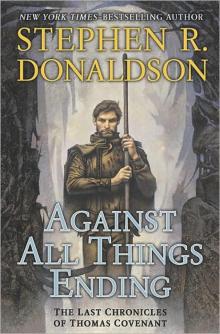 Against All Things Ending
Against All Things Ending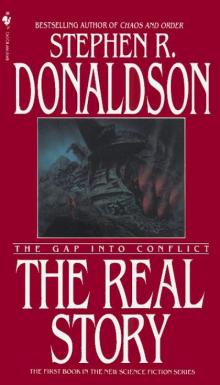 The Real Story: The Gap Into Conflict
The Real Story: The Gap Into Conflict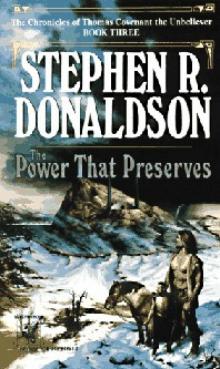 The Power That Preserves
The Power That Preserves Seventh Decimate
Seventh Decimate The Gap Into Power: A Dark and Hungry God Arises
The Gap Into Power: A Dark and Hungry God Arises A Man Rides Through
A Man Rides Through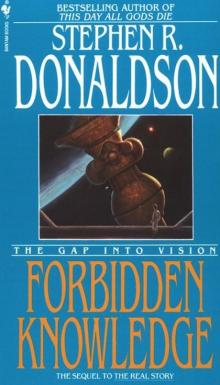 The Gap Into Vision: Forbidden Knowledge
The Gap Into Vision: Forbidden Knowledge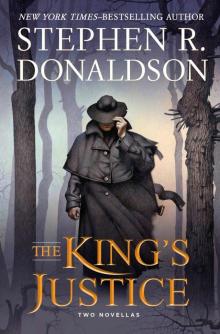 The King's Justice: Two Novellas
The King's Justice: Two Novellas The Wounded Land
The Wounded Land The Runes of the Earth
The Runes of the Earth Mordant's Need
Mordant's Need The One Tree
The One Tree Gilden-Fire
Gilden-Fire Reave the Just and Other Tales
Reave the Just and Other Tales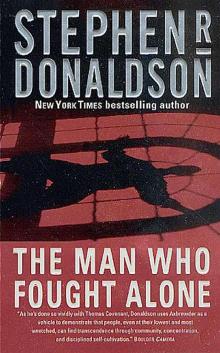 The Man Who Fought Alone
The Man Who Fought Alone The Last Dark
The Last Dark The Man Who Tried to Get Away
The Man Who Tried to Get Away Thomas Covenant 02: The Illearth War
Thomas Covenant 02: The Illearth War A Dark and Hungry God Arises
A Dark and Hungry God Arises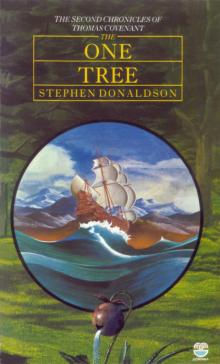 The One Tree t2cotc-2
The One Tree t2cotc-2 Lord Foul's Bane cotc-1
Lord Foul's Bane cotc-1 The Illearth War t1cotc-2
The Illearth War t1cotc-2 The Runes of the Earth: The Last Chronicles of Thomas Covenant - Book One
The Runes of the Earth: The Last Chronicles of Thomas Covenant - Book One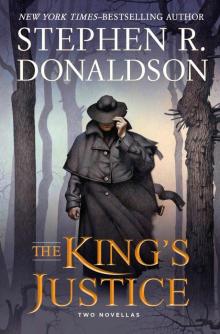 The King's Justice
The King's Justice White Gold Wielder t2cotc-3
White Gold Wielder t2cotc-3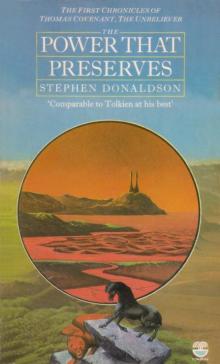 The Power That Preserves t1cotc-3
The Power That Preserves t1cotc-3 Thomas Covenant 01: Lord Foul's Bane
Thomas Covenant 01: Lord Foul's Bane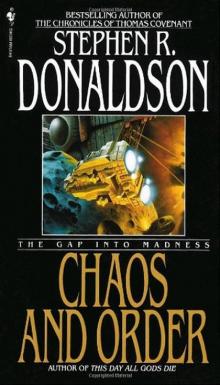 Chaos and Order: The Gap Into Madness
Chaos and Order: The Gap Into Madness Daughter of Regals
Daughter of Regals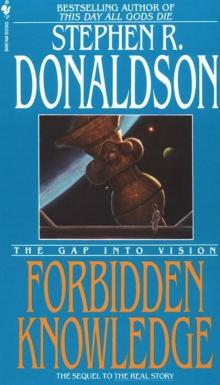 Forbidden Knowledge: The Gap Into Vision
Forbidden Knowledge: The Gap Into Vision Fatal Revenant t3cotc-2
Fatal Revenant t3cotc-2 The Runes of the Earth t3cotc-1
The Runes of the Earth t3cotc-1 Thomas Covenant 03: Power That Preserves
Thomas Covenant 03: Power That Preserves This Day all Gods Die: The Gap into Ruin
This Day all Gods Die: The Gap into Ruin The Wounded Land t2cotc-1
The Wounded Land t2cotc-1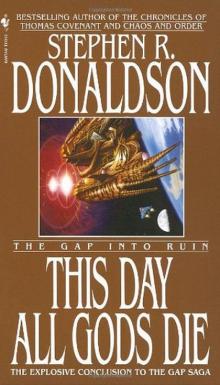 This Day All Gods Die
This Day All Gods Die One Tree
One Tree